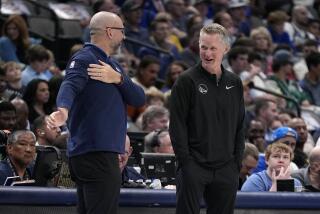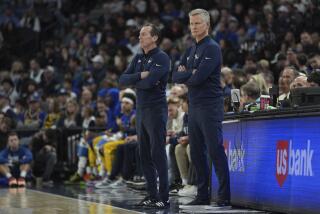Intense Dick Motta: ‘Billy Martin in a Suit and Tie’
- Share via
SACRAMENTO — Jerry Sloan, coach of the Utah Jazz, played under Dick Motta for eight years with the Chicago Bulls. A tough, relentless guard, Sloan personified the Motta Bulls’ take-no-prisoners attitude.
Upon hearing that his former boss was returning to the NBA wars as the Sacramento Kings’ coach, Sloan was asked for a one-word description of him.
“Intense,” he said. “That was one of the first things that impressed me about him, and it never changed in the eight years I played for him. He was very intense about winning.”
Various forms of the word “intense” kept surfacing in conversations with people who have known the professional Dick Motta, who was officially named coach of the Kings on Thursday.
It wasn’t the only description they offered, however. A one-word description might suggest a one-dimensional man, and several former colleagues reached by a reporter said “one-dimensional” is the last word they would use to describe Motta.
“He’s a schoolteacher first and foremost,” said Steve Hirshey, a writer for USA Today who covered the Washington Bullets when Motta was their coach. “I learned an awful lot from him, and not just basketball.”
Jerry Colangelo, president of the Phoenix Suns who first brought Motta to the NBA’s attention, said he was “fascinated” by Motta’s approach to basketball.
“This is a very positive move for Sacramento,” Colangelo said. “He’ll bring some real stability to that franchise. He’s a winner, and very quickly he’ll get that point across.”
Orlando Magic President Pat Williams, who worked with Motta in Chicago, described him as “a feisty ringmaster, driven, obsessed . . . Billy Martin with a coat and tie on.”
Ish Haley of the Dallas Times Herald, who covered Motta’s years in Dallas, called him a breath of fresh air. “In 25 years covering sports, he’s one of the most interesting people I’ve ever dealt with,” Haley said. “You’ll enjoy him.”
Kings fans will enjoy Motta plenty if he can get the struggling team to win some games. With 808 victories in 19 years at Chicago, Washington and Dallas, Motta is the third-winningest coach in NBA history, exceeding even Colangelo’s expectations.
“I was scouting for the Bulls in 1968, and I went to see Ron Boone play for Idaho State against Weber State in Pocatello, Idaho,” Colangelo recalled. “Dick was the Weber State coach, and I was struck by the way he seemed to have a handle on things--the way he conducted himself, communicated with his players, dealt with officials. We got together and talked basketball that night in the coffee shop of the Brown Palace Hotel.
“I went back to Chicago and told our owner, Dick Klein, that I’d come across this guy who really fascinated me. He said, ‘Who the hell is Dick Motta and where the hell is Weber State?’ Then I left to run this (Phoenix) franchise when it was starting up, and a few months later I read that the Bulls had hired Dick Motta.”
He was not a popular choice. Bob Logan, who covered the Bulls for the Chicago Tribune, recalls one snide reference to the unknown coach as “Dick Weber from Motta State.” But “Weber” knew what he wanted.
“He couldn’t stand Flynn Robinson, who’d averaged about 21 points the year before. He was a gunner who didn’t want to do anything but shoot, but he was popular,” Logan recalls. “About 12 games into his first season, Dick storms into Klein’s office and says, ‘Either Robinson goes or I go.’ Klein is flabbergasted, but he calls around and gets Milwaukee to take Robinson for Bob Love and Bobby Weiss. Turns out to be the best trade in franchise history, and they made it with a gun to their heads.”
A deal for Chet Walker two years later gave the Bulls the best pair of forwards in the league, and around them Motta fashioned a team in his own combative image, while Williams filled the seats with zany promotions. But an ownership change left Motta above Williams in the team’s hierarchy, which led to a falling out and Williams’ eventual departure. Just as damaging was Motta’s decision to trade center Clifford Ray for an over-the-hill Nate Thurmond. After four straight 50-win seasons, the best team that never won a title fell apart, and Motta departed after the 1975-76 season.
“He could have been Mike Ditka--with his work ethic, he was a Chicago kind of guy, but he was never comfortable in the big city,” Logan says.
“A guy with his intensity . . . you can only listen to him for so long and then you stop listening. In college, he was used to losing two or three games. In the pros, you can lose two or three in a week, and he had to learn how to handle that. He does not mince words or suffer in silence. But I have the utmost respect for him as a basketball coach.”
Motta moved to the Washington Bullets after leaving Chicago, inheriting a well-established team built around Elvin Hayes and Wes Unseld. The Bullets were in the NBA Finals in two of his four years there, winning the title in 1978.
In Dallas, he built an expansion team into a 55-game winner over seven years. General manager Norm Sonju remains “stunned” by his departure 2 1/2 years after the fact.
“The time off will make a world of difference,” Sonju said. “He won’t be under as much pressure, and he’ll have the time of his life. When he’s not uptight he’s fun to be around, but you have to remember--this is serious business to him.”
Hirshey used to kid Motta about his “high-school offense.”
“He runs about four basic plays, but it’s like Vince Lombardi’s offense--even if you know what’s coming, try and stop it.”
Hirshey knew what winning an NBA title meant to Motta, and a memory of the decisive game in the ’78 Finals remains with him. “They were ahead of Seattle by three or four points with 1:40 to go. He walked down the floor to get a better look at the clock, and you knew he he wanted that 1:40 to just disappear, but he leaned over the press table and said, ‘You should never wish any part of your life away.’
“That really struck me. He’s always into it, but he’s a human being throughout.”
Sloan also spoke of Motta’s human side.
“I always thought he was one of the best coaches in basketball, and I consider myself fortunate to have played eight years for him. He’s known as a disciplinarian, and I guess he is in the sense that if a guy doesn’t want to work, doesn’t want to play hard, he won’t play. He approaches it very seriously--it’s his profession, and he wants the players to feel the same way.”
More to Read
Go beyond the scoreboard
Get the latest on L.A.'s teams in the daily Sports Report newsletter.
You may occasionally receive promotional content from the Los Angeles Times.










